- Samdech Akka Moha Sena Padei Techo Hun Sen, Prime Minister of the Kingdom of Cambodia paid a State Visit to the Republic of India from 24-27 January 2018 at the invitation of H.E. Shri Narendra Modi, Prime Minister of the Republic of India. The Prime Minister of Cambodia was accompanied by a high level delegation which included Ministers and senior officials and also a business delegation.
- During the visit on 27 January 2018, the Prime Minister of Cambodia was received by the Prime Minister of India and accorded the ceremonial Guard of Honour at the Rashtrapati Bhawan. The Prime Minister of Cambodia visited Raj Ghat and paid floral tribute at the Memorial of Mahatma Gandhi. He called on H.E. Shri Ram Nath Kovind, President of India and H.E. Shri M. Venkaiah Naidu, Vice President of India. He held delegation level talks with Prime Minister of India Shri Narendra Modi, who hosted a banquet in his honour. External Affairs Minister Smt Sushma Swaraj called on the Prime Minister of Cambodia.
- Earlier, along with other ASEAN leaders Samdech Prime Minister Hun Sen participated in the ASEAN-India Commemorative Summit on 25 January and also attended the Republic Day Parade on 26 January as Guest of Honour. The Prime Minister of Cambodia also attended a Business meeting and delivered a keynote address, and visited the Centre of e-Governance of the Ministry of Electronics and Information Technology in New Delhi.
- The delegation level talks between Cambodia and India were held on 27 January in a warm, cordial and friendly atmosphere, reflecting the excellent bilateral relations and friendship. The ties between the two countries are millennia old and deeply rooted in history, with interactions in multidimensional fields and extensive people-to-people contacts. The two Prime Ministers held wide-ranging discussions on bilateral, regional and multilateral issues, with a common goal to work closely to further strengthen the bilateral relations as well as cooperation in regional and international organisations.
ECONOMIC RELATIONS
- The two leaders recognized the importance of bilateral trade and noted that economic relations are important for strengthening the bilateral ties. Both leaders agreed that there exists significant potential to increase and diversify both the volume and composition of bilateral trade. There should also be greater bilateral trade and investment which would serve to strengthen and enhance comprehensive bilateral relations. To this end, the two leaders agreed that the business chambers and export promotion organisations would be encouraged to regularly participate in business events in each other’s countries and explore possibilities of greater economic and commercial cooperation.
- The Prime Minister of Cambodia invited Indian investments and Indian companies to explore opportunities for collaboration, including in the field of information technology, pharmaceuticals, agriculture and horticulture, infrastructure and small and medium enterprises (SMEs). The Prime Minister of India welcomed the suggestion of the Prime Minister of Cambodia to help train Cambodian youth in information technology. To this effect, the Prime Minister of India announced support of the Government of India to set up a Centre of Excellence in Information Technology in Cambodia.
- Both leaders agreed on an early signing of a Bilateral Investment Treaty between the two countries.
CONNECTIVITY
- Both leaders noted with satisfaction the progress in regional connectivity efforts such as the India-Myanmar-Thailand Trilateral Highway and agreed to explore the possibility of extending this Highway further to Cambodia and beyond. Both leaders agreed to have scheduled services operated by designated airlines of respective countires in the near future and supported the expansion of the air traffic rights and civil aviation arrangements to facilitate the people-to-people contacts and promote tourism between the two countri
DEFENCE AND SECURITY
- Both leaders expressed satisfaction at the current state of bilateral defence ties, including ship visits and training programmes. They agreed to further enhance defence ties, including through exchanges of senior level defence personnel, capacity building projects, etc.
- Both sides expressed a keen interest in enhancing cooperation in maritime domain, including sustainable marine development and protection and preservation of marine and coastal environment, anti-piracy cooperation, security of sea lanes of communication to maintain peace and ensure safety and security of navigation in the Indo-Pacific Region. They also agreed that peace and maritime security is important for both countries. To that end, they support complete freedom of navigation and overflight and pacific resolution of maritime issues based on international law, notably the1982 UNCLOS.
- The two leaders agreed that terrorism is a curse on human-kind and poses a grave threat to global peace, security and stability. They unequivocally condemned terrorism in all its forms and manifestations and underscored that there is no justification whatsoever for acts of terrorism and recognized that terrorism cannot be and should not be associated with any religion, nationality, civilization or ethnic groups. They called for joint and concerted global efforts to eliminate terrorism in all its forms and manifestations in accordance with the principles of international law. They called upon all nations to adopt a comprehensive approach in combatting terrorism, which should include countering radicalization, recruitment, movement of terrorists including Foreign Terrorist Fighters; blocking sources of financing terrorism including through organized crimes, money-laundering, supply of weapons of mass destruction, drug trafficking and other criminal activities; dismantling terrorist bases, and countering misuse of the internet including social media and information and communication technologies by terrorist entities.
- Reaffirming their solidarity and resolve to fight terrorism, the two leaders affirmed that those responsible for committing, abetting, organizing and supporting terrorist acts must be held accountable and be punished. They emphasized the central and vital role of the United Nations in fighting terrorism and recognized that the UN Global Counter-Terrorism Strategy is a unique global instrument that will enhance national, regional and international efforts to counter terrorism. They also called for swift and effective implementation of relevant UN Security Council resolutions to combat terrorism worldwide. In this connection, they also agreed to work together and with the international community in building a new global resolve and strategy for combating terrorism, in preventing financing of terrorist networks and terrorist acts and denying terrorists safe haven and called for an early adoption of the Comprehensive Convention on International Terrorism (CCIT). The two leaders also emphasized the responsibility of all States to prevent financing of terrorist networks and terrorist acts from their territories, and safe havens.
- The two leaders further agreed that terrorism cannot be used as an instrument of state policy for furthering narrow political objectives. They strongly condemned violence perpetrated by all terrorist groups and called for all nations to work for designation of all terrorist groups under relevant resolutions of the UN Security Council.
- The two leaders reaffirmed their collaboration in combating all forms of Human Trafficking especially of women and children by signing a bilateral Memorandum of Understanding for prevention, rescue, recovery, repartiation and re-integration of the victims of trafficking. Moreover they acknowledge the importance of signing a bilateral treaty on Mutual Legal Assistance on Criminal Matters in order to promote cooperation for effective enforcement of laws against crimes in both countries.
- The Prime Minister of India highly appreciated Cambodia for hosting the goodwill visits of Indian ships for three consecutive years starting from 2015 to 2017.
CULTURE, EDUCATION, AND PEOPLE-TO-PEOPLE EXCHANGES
- The two leaders agreed to encourage closer people-to-people contact, through inter alia, promoting education and cultural cooperation as well as by promoting tourism.
- The two leaders agreed to deepen cultural and historical ties between the two countries by promoting diverse cultural exchanges between the peoples of the two countries and welcomed the signing of the Executive Programme of Cultural Exchange for 2018-2022.
- The two sides agreed to cooperate further in the areas of archaeology, conservation and museums to revive and reconnect the civilizational and cultural connections between the two countries. In this regard, the Prime Minister of India reaffirmed India’s commitment to undertake restoration and conservation work at the ancient temple of Lord Shiva at Preah Vihear and also expressed satisfaction over the ongoing restoration work at Ta Prohm temple being carried out by Archaeological Survey of India.
DEVELOPMENT COOPERATION
- The Prime Minister of Cambodia highly appreciated India’s Lines of Credit and grants-in-aid being extended for developmental projects in Cambodia, restoration and conservation of temples, capacity building programme, scholarship scheme as well as funding for social development through Quick Impact Projects under Mekong Ganga Cooperation initiative.
REGIONAL COOPERATION
- The two leaders expressed their desire to further enhance the ASEAN-India Strategic Partnership. With a view to underscore the significance of sub-regional frameworks, the Prime Ministers viewed that developing the Mekong-India Economic Corridor would complement ASEAN well.
MULTILATERAL COOPERATION
- The two leaders reiterated their strong support for the ongoing reform of the United Nations and its principal organs with a view to making the United Nations more democratic, transparent and efficient so that it can deal more effectively with the myriad challenges of the contemporary world. They emphasized the importance of an early reform of the United Nations Security Council so that it reflects the contemporary realities and functions in a more accountable, representative and effective manner. The Cambodian side reiterated its support for India’s permanent membership of the reformed and expanded UN Security Council. The Indian side reiterated its support for Cambodia’s candidature as a member of the United Nations Economic and Social Council for the term 2019.
- Both leaders welcomed the adoption of the 2030 Agenda for Sustainable Development and reiterated their commitment to the realisation of the Sustainable Development Goals (SDGs). They agreed that the Global Partnership remains key to the achievement of the SDGs. In this regard, both leaders recalled the Addis Ababa Action Agenda and the importance of fulfilment of the Official Development Assistance committed by the developed countries.
- The Prime Minister of India welcomed Cambodia’s decision to join the International Solar Alliance (ISA). The two leaders agreed to explore the possibility to cooperate further in the area of solar energy. India also extended invitation to Cambodia to participate in the Founding Conference of ISA which is scheduled to be held on 11 March, 2018 in New Delhi.
- The Prime Minister of India conveyed India’s commitment to continue development partnership in areas of priority of the Government of the Kingdom of Cambodia. In this regard, India would increase the number of Quick Impact Projects (QIP) from five to ten annually in Cambodia. India would also help in setting up a Centre of Excellence in IT and IT-enabled services in Cambodia. The two sides also agreed on a US$ 20 million concessional line of credit by India for construction of transmission line in Cambodia and agreed to work towards its signing in the near future. The Government of India offered additional lines of credit for infrastructure projects in Cambodia, including in sectors such as health (setting up of super specialty hospitals) and connectivity (road, rail and digital).
- The Prime Minister of Cambodia, after his visit to the Centre of e-Governance of the Indian Ministry of Electronics and Information Technology, expressed appreciation of India’s IT applications in the field of agriculture. The Prime Minister of India expressed India’s willingness to assist Cambodia in agriculture related IT applications including Soil Health Cards for farmers and establishment of electronic National Agriculture Market.
- After the delegation-level talks, the two Prime Ministers witnessed the exchange of agreements, namely:
- Memorandum of Understanding on prevention of Human Trafficking
- Mutual Legal Assistance Treaty in Criminal Matters
- Cultural Exchange Programme
- Dollar credit line agreement for US $36.92 million for the Stung Sva Hab water resource development project.
- The Prime Minister of Cambodia welcomed India’s continued support for narrowing the development gaps within and between ASEAN member-states by enhancing capacity building, sharing technical expertise through utilisation of Project Development Fund, Quick Impact Project (QIP) scheme in CLMV countries, scholarship and training programmes, and other grant and LOC projects as well as supporting Initiative for ASEAN Integration Work Plan III. He also welcomed India’s offer at the ASEAN-India Commemorative Summit to undertake a pilot project on rural connectivity which would create digital villages in CLMV countries. In this context, he highly appreciated India’s cooperation in Cambodia’s socio-economic development.
- The Prime Minister of Cambodia expressed his gratitude to Prime Minister Narendra Modi and to the people of India for the warm welcome and hospitality extended to him and the members of his delegation during his State visit. He also congratulated Prime Minister Modi on the successful conclusion of the ASEAN-India Commemorative Summit, and wished great success to the people of India in significant initiatives and policies undertaken during the past three years under Prime Minister Modi’s wise leadership.
- Samdech Prime Minister Hun Sen extended an invitation to Prime Minister Modi to visit Cambodia at a mutually convenient time. Prime Minister Modi expressed his appreciation for the invitation and assured his counterpart a return visit in the future to further intensify friendship and cooperation between the two countries.
New Delhi
27 January 2018


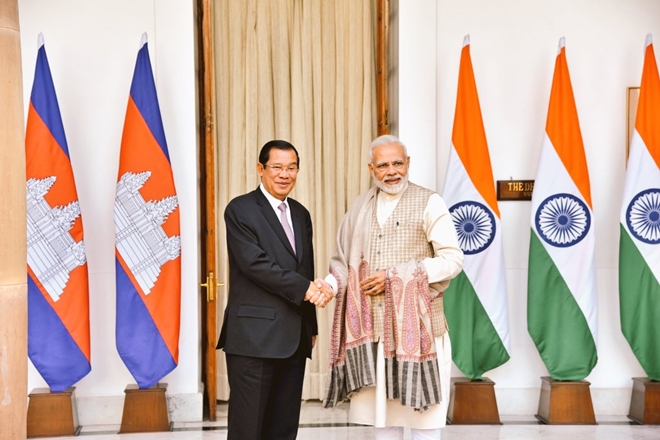


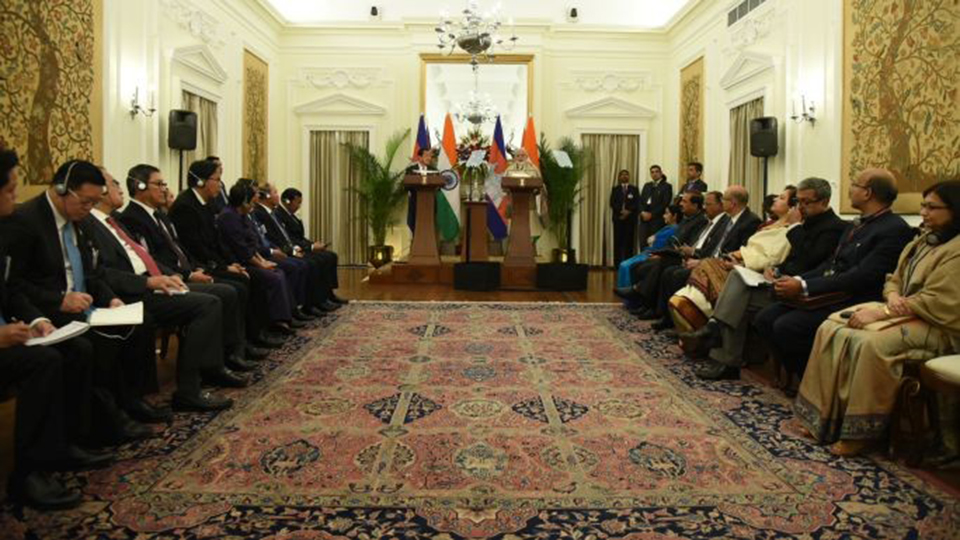
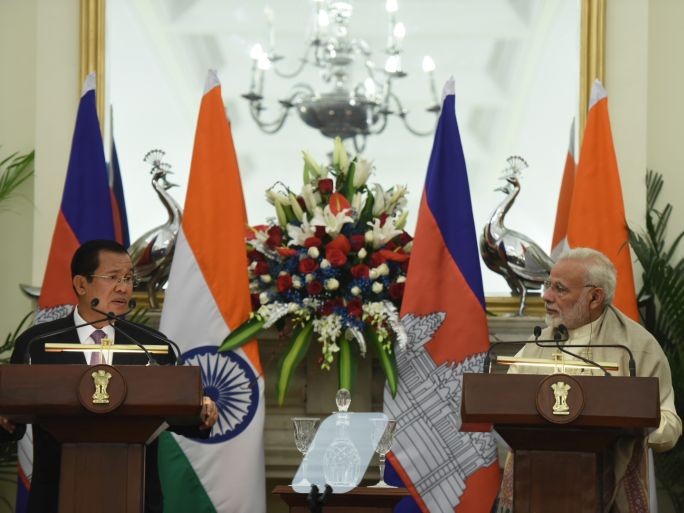


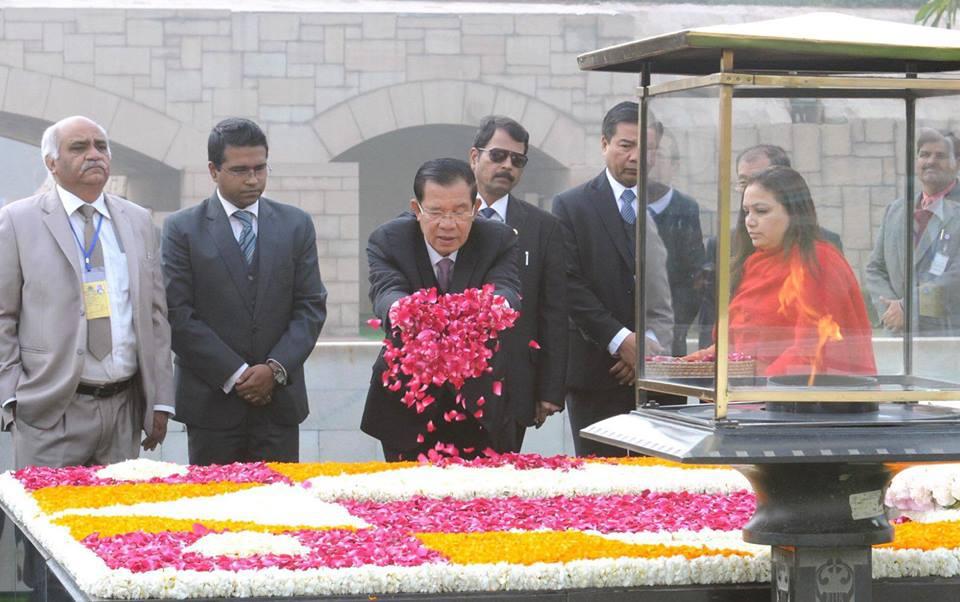
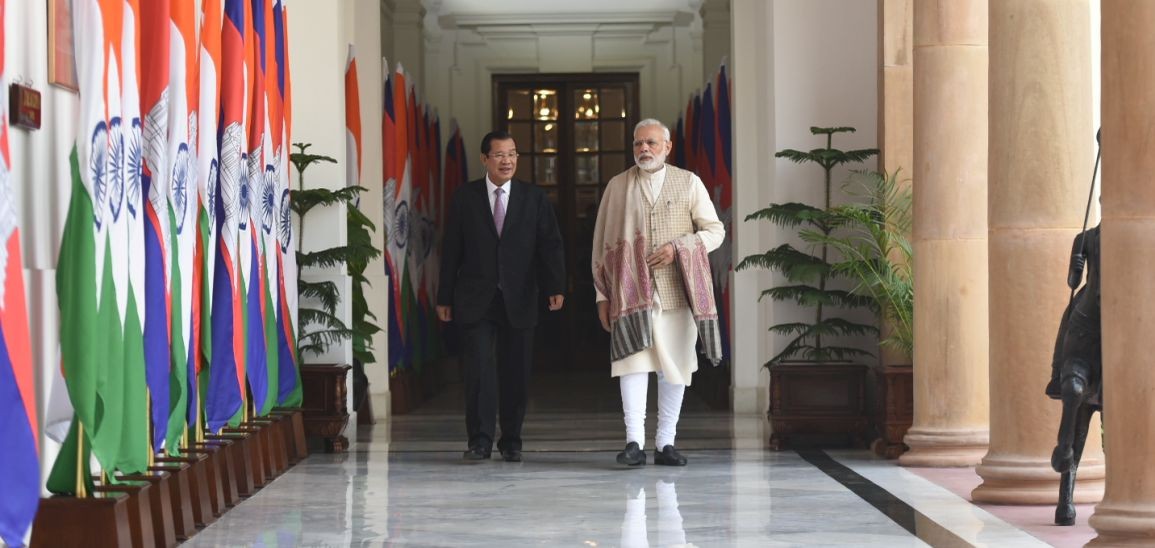

![Selected Comments of Samdech Thipadei Hun Manet, at the closing ceremony of the 2023 and 2024 work results and 2025 work directions setting of the Ministry of Mines and Energy [Unofficial Translations]](https://pressocm.gov.kh/wp-content/uploads/2024/12/photo_2024-11-21_17-21-14-100x70.jpg)
![Samdech Thipadei Hun Manet. Koh Kut – mixing politics with technology would harm national interests [Unofficial Translations]](https://pressocm.gov.kh/wp-content/uploads/2024/12/photo_2024-11-21_11-40-29-100x70.jpg)
![Selected Comments of Samdech Techo HUN SEN. at the opening of the 32nd National Congress of Buddhist Monks in 2024 [Unofficial Translation]](https://pressocm.gov.kh/wp-content/uploads/2024/11/fn-2024-11-21-10-17-56-0-100x70.jpg)
